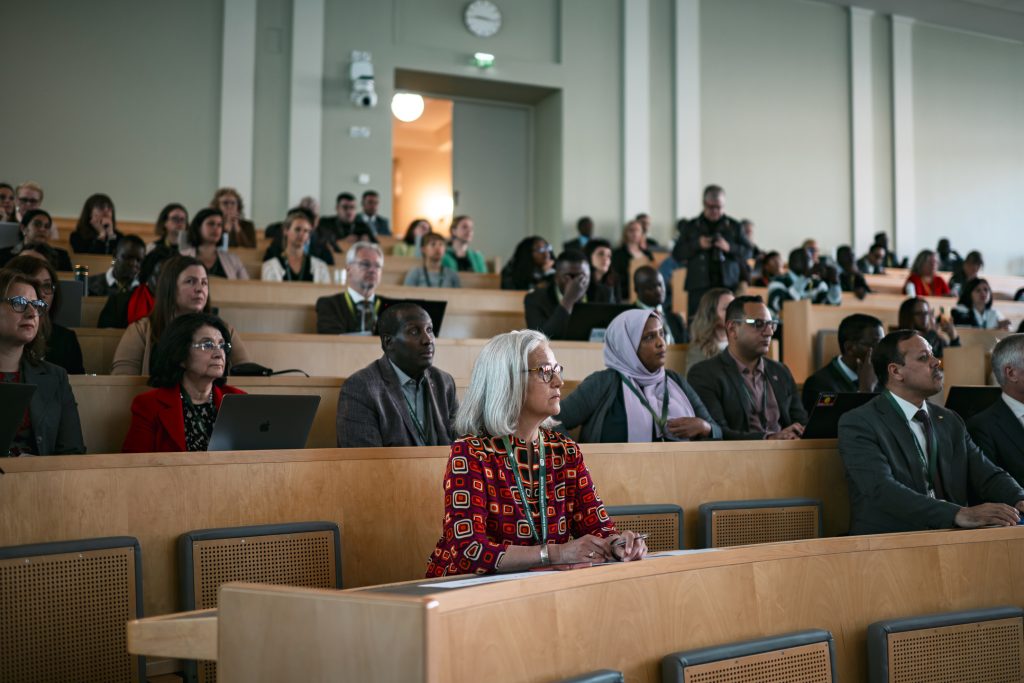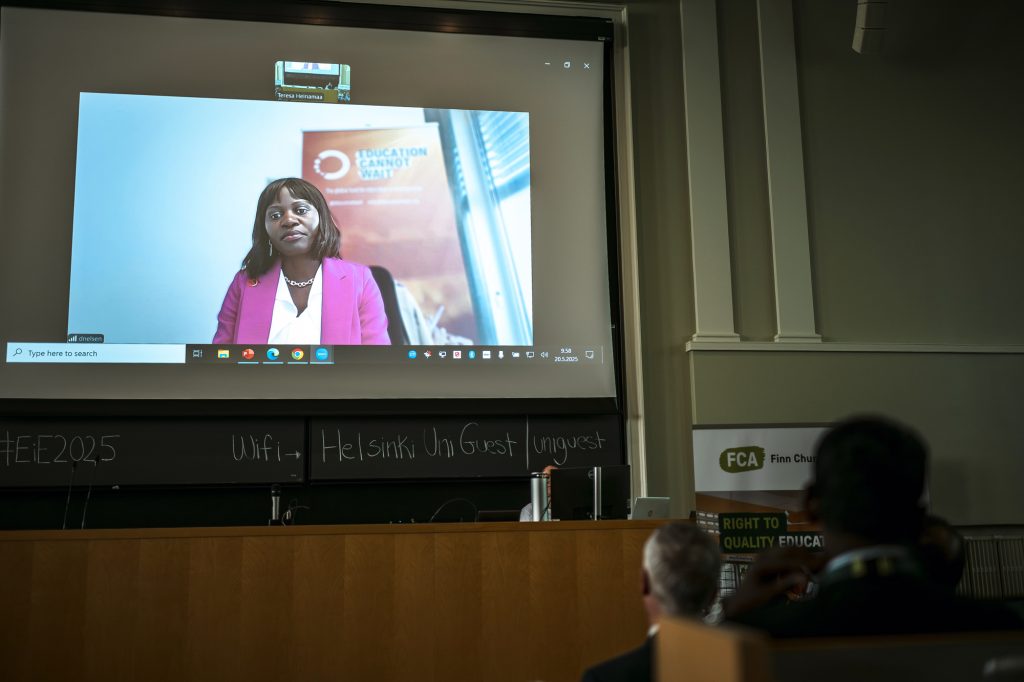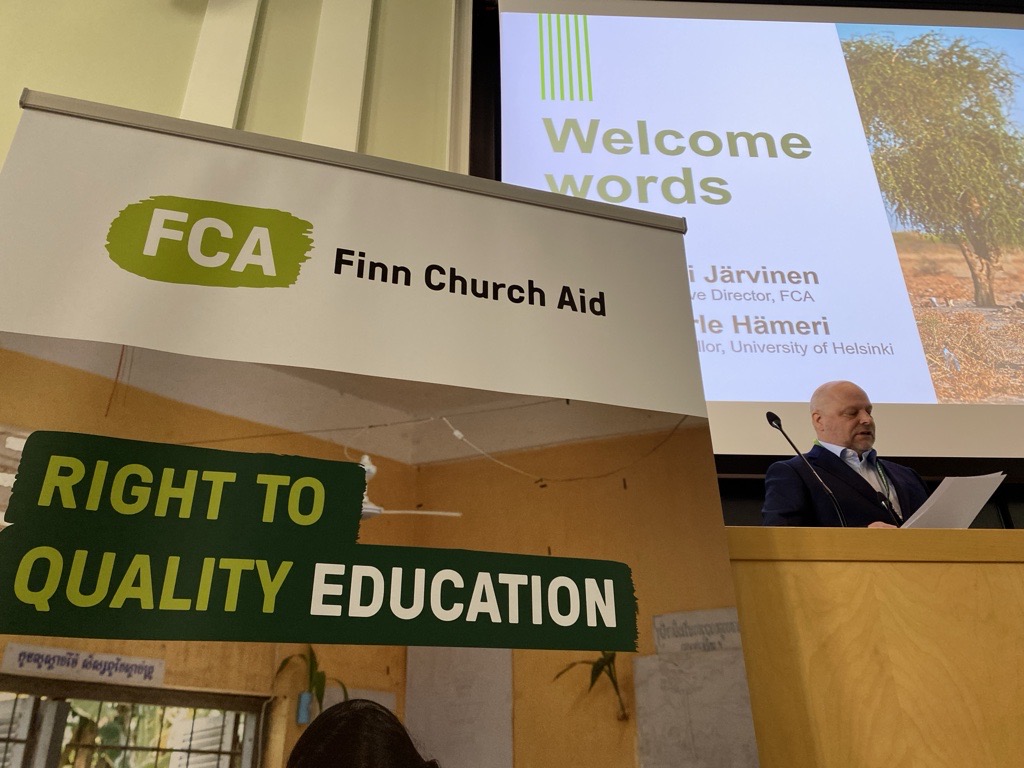FCA’s large-scale international education in emergencies conference in Helsinki asks – ‘whose reality is shaping global policy’?
Educators on the frontline of crises in Kenya, Ukraine, Gaza and other areas joined education experts from four continents in Helsinki this week for the international Education In Emergencies conference, organised by Finn Church Aid (FCA) and the University of Helsinki.
FCA LAUNCHED a major call to action, with Education Cannot Wait and International Rescue Committee, calling donor governments and institutions like the UN to prioritise education as a life-saving intervention.
Taglined ‘A Lifeline for the Future’, the conference at the University of Helsinki heard the latest expert views as well as personal stories from teachers working in war zones, leading classes of over 200 children in refugee settlements, and supporting the psychological and emotional wellbeing of entire communities.
The conference also hosted high-level speakers like Mikaela Nylander, Secretary of State for Finland’s Ministry of Education and Culture; Dr. Nafieh Assaf, Deputy Minister of Education, Palestine and His Excellency Rashed Al Hemeiri, Director of Development and International Cooperation at United Arab Emirates Ministry of Foreign Affairs; and Ms. Margarita Focas Licht, Director of Partnerships, Global Partnership for Education (GPE).

Teachers at the frontline
Valentine Moige is a special needs education specialist in Kalobeyei refugee settlement in Kenya, who has seen huge reducations in support for children with disabilities since the US cut funds for overseas aid:
“We are not only facilitators of learning, we are the backbone of recovery. The cornerstone of resilience. But children are missing out on vital lifeskills, because of the cutting of funds.”
Valentine Moige is a special needs education specialist, working in refugee settlements in Kenya. In this video she talks about the challenges for teachers as aid for education is severely cut.
In Ukraine, many teachers hold classes underground in bunkers, metro stations or online. Nataliia Savchenko is a School Principal facing huge challenges as 30 per cent of the children learn remotely from territories occupied by Russia. This puts huge pressure on teachers:
“Ukrainian teachers are alone and under constant stress. They are teaching under bombings and shellings, in shelters and without the chance to have face to face lessons.”

Education lifesaving, yet critically underfunded
Education Cannot Wait’s Dianah Nelsen joined the conference to highlight their new report, which reveals that 234 million children need support to access quality education with 84 million out of school completely.
“Millions of children are asking for the same – a place to learn, to feel safe, under the guidance of a teacher. But today, the threat to humanitarian aid is real. Funding cuts are hitting all sectors.”
And while importance of teachers and of education as lifesaving intervention has been recognised for decades, donors consistently deprioritise it in humanitarian aid. FCA’s Executive Director, Tomi Järvinen highlighted that aid to education accounts for only 3% of global humanitarian funding, making it one of the least funded humanitarian areas.

“When we think of emergencies, we think of food, water, shelter, and safety. But where do children often receive all of these? At school,” he said.
Faiza Hassan from the Inter-agency Network for Education in Emergencies took the disconnect further:
“Education is lifesaving? People living in crisis already know this,” she stated. “Whose reality is shaping global policy? People with their Excel spreadsheets don’t understand the importance of education when society collapses around you. We need to move beyond making the same advocacy points. We need to find funding beyond the current aid model.”
Jointly finishing the two day conference, FCA’s Country Director for Myanmar, Lin Min Aung, spoke about the impact education has in his country, stating “crisis has no border and neither can our compassion”, while University of Helsinki Dean of the Faculty of Educational Sciences, Johanna Mäkelä, set the tone for the work to come:
“We are now experiencing some dark and frightening times, but I think education is the foundation: for democracy; equality; rule of law; and participation in a better world.
—
Join the call to action by signing by May 28th 2025. Find out more about the agenda and the speakers at the offical EiE Helsinki website.
—
All photos unless specified: Antti Yrjönen/FCA